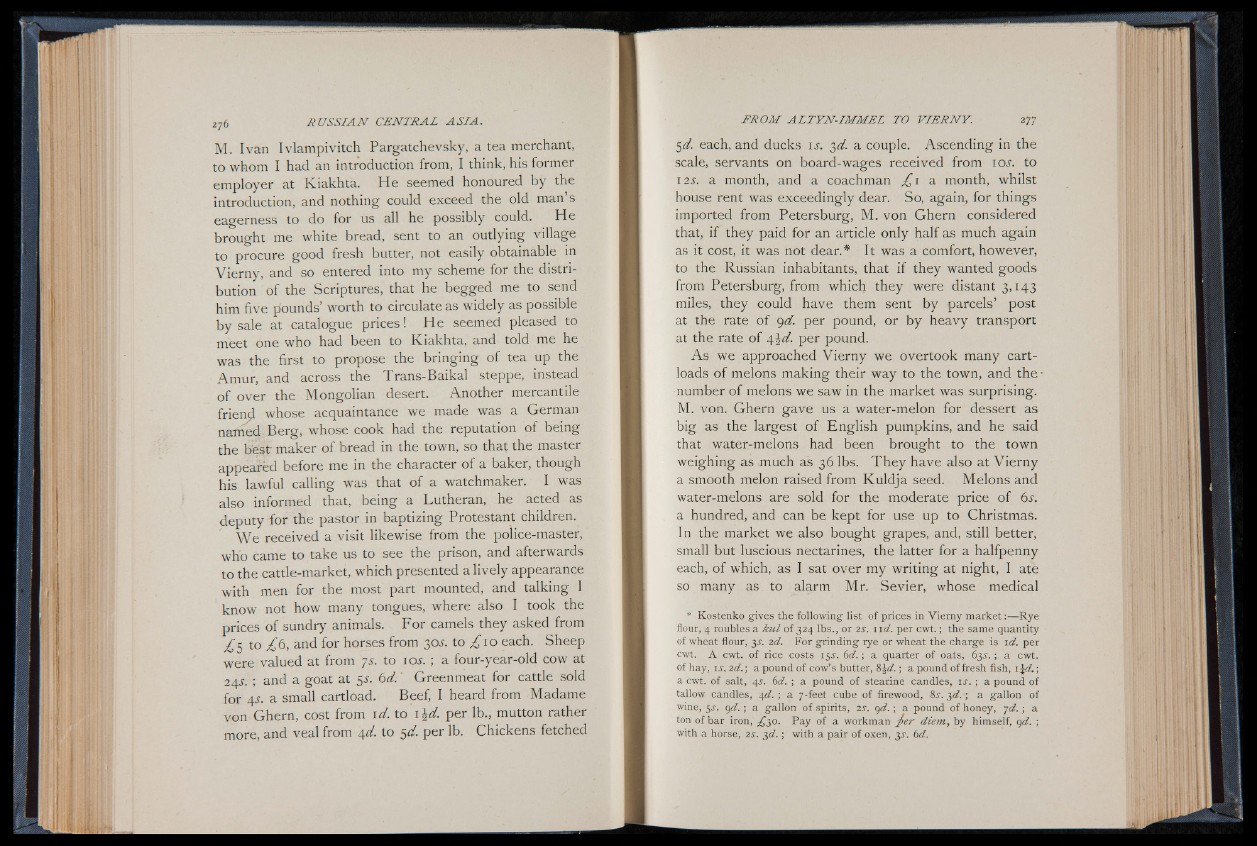
M. Ivan Ivlampivitch Pargatchevsky, a tea merchant,
to whom I had an introduction from, I think, his former
employer at Kiakhta. He seemed honoured by the
introduction, and nothing could exceed the old man’ s
eagerness to do for us all he possibly could. He
brought me white bread, sent to an outlying village
to procure good fresh butter, not easily obtainable in
Vierny, and so entered into my scheme for the distribution
of the Scriptures, that he begged me to send
him five pounds’ worth to circulate as widely as possible
by sale at catalogue prices! He seemed pleased to
meet one who had been to Kiakhta, and told me he
was the first to propose the bringing of tea up the
Amur, and across the Trans-Baikal steppe, instead
of over the Mongolian desert. Another mercantile
friend whose acquaintance we made was a German
nameck Berg, whose cook had the reputation of being
the best maker of bread in the town, so that the master
appeared before me in the character of a baker, though
his lawful calling was that of a watchmaker. I was
also informed that, being a Lutheran, he acted as
deputy for the pastor in baptizing Protestant children.
We received a visit likewise from the police-master,
who came to take us to see the prison, and afterwards
to the cattle-market, which presented a lively appearance
with men for the most part mounted, and talking I
know not how many tongues, where also I took the
prices of sundry animals. For camels they asked from
^5 to £ 6 , and for horses from 30s. to £ 10 each. Sheep
were valued at from fs. to ioi. ; a four-year-old cow at
24s. ; and a goat at 5s. 6d.' Greenmeat for cattle sold
for 4s. a small cartload. Beef, I heard from Madame
von Ghern, cost from id. to i\d. per lb., mutton rather
more, and veal from 4d. to 5d. per lb. Chickens fetched
5d. each, and ducks is. 3d. a couple. Ascending in the
scale, servants on board-wages received from i o a to
123. a month, and a coachman £ 1 a month, whilst
house rent was exceedingly dear. So, again, for things
imported from Petersburg, M. von Ghern considered
that, if they paid for an article only half as much again
as it cost, it was not dear.* It was a comfort, however,
to the Russian inhabitants, that if they wanted goods
from Petersburg, from which they were distant 3,143
miles, they could have them sent by parcels’ post
at the rate of 9d. per pound, or by heavy transport
at the rate of 4\d. per pound.
As we approached Vierny we overtook many cartloads
of melons making their way to the town, and the
number of melons we saw in the market was surprising.
M. von. Ghern gave us a water-melon for dessert as
big as the largest of English pumpkins, and he said
that water-melons had been brought to the town
weighing as much as 36 lbs. They have also at Vierny
a smooth melon raised from Kuldja seed. Melons and
water-melons are sold for the moderate price of 6s.
a hundred, and can be kept for use up to Christmas.
In the market we also bought grapes, and, still better,
small but luscious nectarines, the latter for a halfpenny
each, of which, as I sat over my writing at night, I ate
so many as. to alarm Mr. Sevier, whose medical
* Kostenko gives the following list of prices in Vierny ma rk et:— Rye
flour, 4 roubles a ku l of 324 lbs., or 2s.\\d. per cw t.; the same quantity
of wheat flour, 3^. 2d. For grinding rye or wheat the charge is id. per
cwt. A cwt. of rice costs 15^. 6d . ; a quarter of oats, 63s.; a cwt.
of hay, is. 2d.; a pound of cow’s butter, 8 \d. ; a pound of fresh fish, \\d.;
a cwt. of salt, 4J. 6d. ; a pound of stearine candles, is. ; a pound of
tallow candles, 4d. ; a 7-feet cube of firewood, 8j. ¡d . ; a gallon of
wine, 5s. 9d . ; a gallon of spirits, 2s. 9d. ; a pound of honey, yd.; a
ton of bar iron, £¡0. Pay of a workman p e r diem, by himself, 9d. ;
with a horse, 2s. ¡ d . ; with a pair of oxen, 3J. 6d.